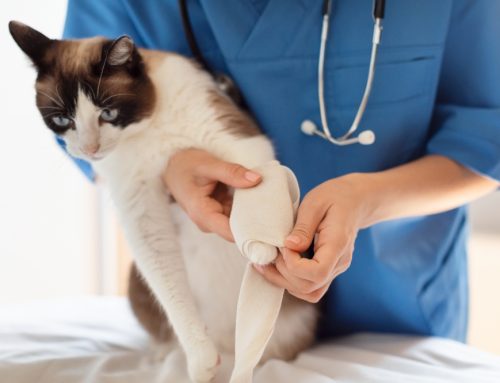Pet ownership not only adds joy, love, and enrichment to our lives, and to the lives of our lucky pets but also comes with significant responsibility. One especially important decision every pet owner faces is whether their dog or cat should be spayed or neutered. Beyond the obvious benefit of preventing unplanned litters, these safe and routine procedures offer countless advantages over your pet’s lifetime and impact their health, behavior, and overall wellbeing.
Here are the Lytle Veterinary Clinic team’s top five reasons to have your pet spayed or neutered.
#1: Spaying and neutering reduces pet overpopulation
One of the most impactful advantages of spaying or neutering your pet is its positive effect on pet overpopulation. Every year, countless unwanted and homeless dogs and cats end up in shelters, where many are euthanized or live out their days without knowing the love and warmth of a forever home. By spaying or neutering your pet, you prevent unwanted litters and play a role in stopping the heartbreaking cycle of homeless pets.
#2: Spaying and neutering enhances your pet’s health
Spaying or neutering your pet is one of the easiest ways to positively impact their long-term health. In female dogs and cats, spaying (i.e., surgical removal of the ovaries and uterus) eliminates uterine infection risk (i.e., pyometra, a potentially deadly condition) and reduces the likelihood of mammary cancer. If your female pet is spayed before their first heat cycle, their mammary cancer risk is virtually zero, and because they can no longer become pregnant, their risk for reproductive emergencies such as dystocia and other delivery-related complications is eliminated.
Neutering male pets (i.e., surgical removal of the sperm-producing testicles) lowers their risk for testicular cancer and prostate problems such as inflammation, cancer, and hyperplasia.
#3: Spaying or neutering may help your pet live longer
As a devoted pet lover, you no doubt will do anything to keep your beloved companion by your side for as long as possible. Fortunately, you don’t have to go to the ends of the earth to positively impact your dog or cat’s longevity. Significant research indicates that spayed or neutered pets generally live longer, healthier lives, largely because their lack of reproductive organs eliminates the risk of certain cancers and diseases and curbs potentially dangerous behaviors that could result in injury or death (e.g., being hit by a car while searching for a mate, two male pets fighting over a female in heat).
When you spay or neuter your pet, you invest in their long-term wellbeing and happiness.
#4: Spaying or neutering can decrease your pet’s hormone-driven behavior
Roaming, urine-marking their territory, and aggression are natural hormone-driven behaviors. Unfortunately, these behaviors in pets can be dangerous and are generally incompatible with life as a domesticated companion. A female dog or cat in heat, for one notable example, is a messy occasion often accompanied by personality changes, requiring the owner’s extra vigilance about their pet’s whereabouts to prevent unwanted pregnancy.
If your pet is already demonstrating hormone-related behaviors, you must understand that spaying or neutering alone may not curb the behavior. You can best effectively reduce any undesirable behaviors—especially those associated with arousal, aggression, or reactivity—by following up with a professional trainer after your pet recovers from surgery.
#5: Spaying and neutering your pet saves money
Spaying and neutering reduces potential veterinary care expenses by thousands of dollars by eliminating the risks for reproductive emergencies, serious or life-threatening injuries associated with hormonal behavior, and the costs associated with raising an unwanted litter. Comparatively speaking, spay and neuter fees are economical one-time costs with an immeasurable return on investment (i.e., your pet’s longer, healthier life).
The time and money you save can be reallocated to other important pet health needs, such as routine preventive care, vaccines, dental cleanings under anesthesia, and training and behavior services, and you can provide the best possible care for your beloved four-legged friend.
When should your pet be spayed or neutered?

In the past, experts recommended spaying or neutering dogs before 6 months of age. This is still the case for dogs who will weigh less than 45 pounds when fully grown, but the proper time for large and giant breeds is still up for debate, because your dog’s reproductive hormones play a critical role in their physical development. Since hormones tell your dog’s long bones when to stop growing, some evidence suggests that early spaying or neutering (i.e., before the growth plates are closed) may predispose dogs to orthopedic injuries, such as cruciate ligament rupture. If you’re unsure about when to schedule your dog’s spay or neuter, your Lytle Veterinary Clinic veterinarian can personally guide you, based on your dog’s breed or mix, current age, and risk factors.
Guidelines for kittens have not changed—kittens should be spayed or neutered before 5 months of age, because they reach sexual maturity faster than their canine friends.
The decision to spay or neuter your pet shows responsibility, love, and concern for your pet and millions of others. In addition to the peace and confidence from knowing that you’re helping your dog or cat enjoy a longer, healthier, and happier life, you can feel good knowing you’re doing your part as a responsible pet owner.
The Lytle Veterinary Clinic team understands that the idea of your pet having surgery can be nerve-wracking. If you have questions or concerns, our staff will happily walk you through the process and explain our extensive safety protocols. Contact us to schedule your pet’s appointment or for additional information about any of our services.







Leave A Comment